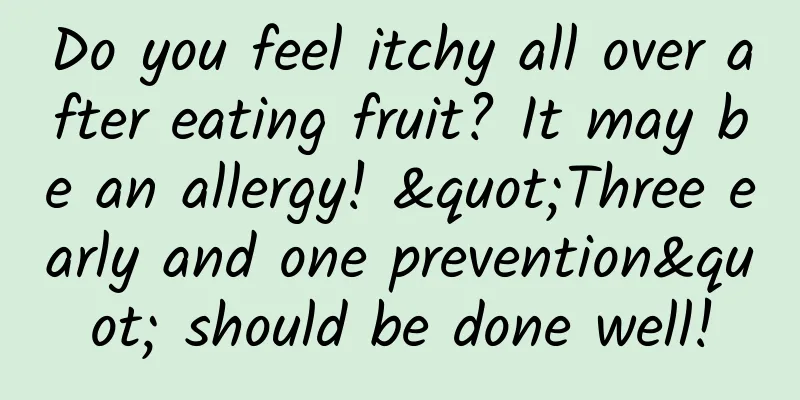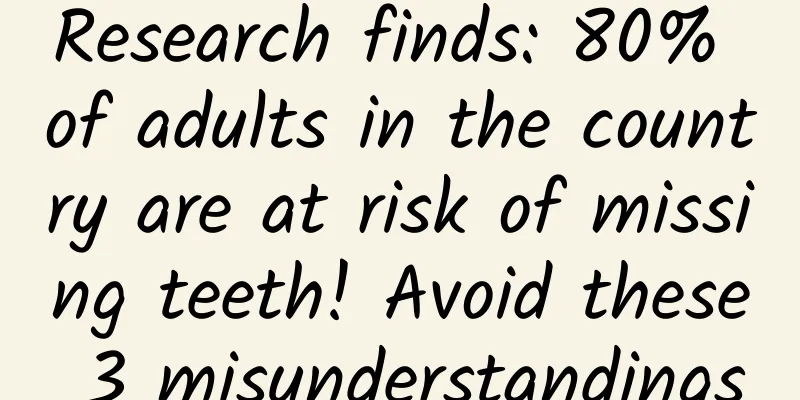Do you feel itchy all over after eating fruit? It may be an allergy! "Three early and one prevention" should be done well!

|
Mention of food allergies The first thing that many people think of is Pollen, milk, peanuts, seafood, etc. Some people eat these foods Skin redness and itching may occur or stomach upset symptoms In addition to these common food allergens Have you ever heard of "fruit" allergy? Man's whole body itches after eating peaches Xiao Wang (pseudonym) from Qingdao went to Guangzhou Zhongshan Hospital No. 3 for medical treatment. He said that after he bit a peach, his throat began to itch unbearably, and then his whole body began to itch. It was very uncomfortable and often lasted for several hours. What's even more strange is that Xiao Wang's allergies have become more and more serious in the past two years. He has developed allergies to fruits such as apples, pears, cherries, apricots, mulberries, and winter dates. The symptoms are almost exactly the same as after eating peaches. After carefully inquiring about the medical history and conducting a detailed examination, Feng Peiying, deputy director of the department, preliminarily judged Xiao Wang to be an "atypical allergic person" who was not allergic to common foods such as milk and eggs, was not allergic to latex, and his family had no similar allergy history. In addition, Xiao Wang's skin prick test showed strong positive allergic reactions to peach, plum, apple, cherry, pear, etc., but in serological examinations, no abnormalities were found in the specific allergens of birch tree and pollen that have some cross-allergens with fruits, and other conventional allergens. Xiao Wang's skin prick test results showed positive reactions on peaches, plums, apples, cherries, and pears. Image source: Department of Allergy, The Third Affiliated Hospital of Sun Yat-sen University Combining the medical history and skin prick test results, Xiao Wang can be clearly diagnosed with "fruit allergy". Can’t you just eat any fruit? Why are some people allergic to fruit? Is there any treatment? What is a fruit allergy? Fruit allergy is a common food allergy reaction and is closely related to many factors such as genetics, environment and fruit type. It often cross-reacts with pollen, especially birch pollen allergy, and is an issue that requires attention in food safety. Allergic reactions: Allergies can affect multiple organs including the skin (local or systemic urticaria, eczematous dermatitis), gastrointestinal tract (abdominal cramps, diarrhea, vomiting), nasopharynx and lungs (rhinitis and asthma, laryngeal edema leading to difficulty breathing), cardiovascular system (anaphylactic shock), etc., and most of them are rapid-type hypersensitivity reactions. Image source: Department of Allergy, The Third Affiliated Hospital of Sun Yat-sen University Peaches remain the most allergenic fruit Peaches are nutritious and delicious, but they have one big drawback - they can easily cause allergies. Survey data from the European Union Respiratory Health Committee shows that peach is the fruit most likely to cause allergies. >>Ranking of allergenic fruits<< 1. Peach (5.4%) 2. Apple (4.2%) 3. Kiwi (3.6%) 4. Banana (2.5%) 5. Melon (1.6%) In addition, the allergy rate of peaches has been increasing year by year. A previous European multi-center (Spain, Switzerland, the Netherlands, Bulgaria, Iceland, and Poland) study found that the allergy rate of peaches was about 7.9%, ranking first in the list of allergenic fruits. A retrospective study on severe allergic reactions in the Chinese population conducted by Peking Union Medical College Hospital also showed that among 1,501 severe allergic reactions induced by food, 20% were induced by fruits/vegetables, and the most common allergenic fruit was peach. How to detect and treat fruit allergies? The diagnosis and severity of acute food allergies need to be confirmed by a professional physician based on the patient's symptoms, medical history and relevant laboratory tests. Image source: Department of Allergy, The Third Affiliated Hospital of Sun Yat-sen University For patients who are allergic to fruits, refer to the diagnostic principles of food allergies. If you find that allergy-related symptoms occur after eating fruits (such as itchy throat, cough, itching all over the body and eczema, vomiting, abdominal pain and diarrhea, etc.), it is recommended to go to a specialist hospital for food allergen testing. The diagnosis needs to focus on: . Have a history of drug, food or other allergies, especially pollen allergies; 2. Family history of allergies; 3. The serum specific allergen receptor test for fruit allergens was elevated, and the total allergen receptor test was elevated; 4. Fruit skin prick test is positive; 5. Positive oral food challenge test. How to prevent fruit allergies? Currently, there is no mature fruit desensitization treatment program in China. Patients are advised to avoid eating fruits that cause allergies, and pay special attention to the fact that some fruits may cause cross-allergies. People who are prone to allergies should try to avoid eating some common allergenic fruits. If they are not sure whether they are allergic to such fruits, they can go to a professional medical institution for food allergy testing. It is recommended to always have anti-allergic drugs on hand. If allergic symptoms occur after accidentally eating allergic fruits, anti-allergic drugs such as antihistamines, mast cell stabilizers, oral or topical corticosteroids, epinephrine, etc. should be used under the guidance of a professional physician. Dietary management recommendations for common allergic fruits (from the 2022 BSACI Pollen Food Syndrome Diagnosis and Management Guidelines) Image source: Guangzhou Daily In addition to preventing fruit allergies Preventing food allergies in daily life What should we do? 4 Steps to Dealing with Food Allergies There is currently no effective cure for food allergies. Patients can only try their best to identify which foods they cannot touch and actively avoid eating them. Doing the following will help with prevention and response. 1. Avoid allergic foods If you find that a certain food may cause an allergic reaction in you, you should avoid eating it again. For example, people with a history of peach allergy should try to avoid eating fresh peaches, canned peaches, and other foods containing peaches. 2. Gradual progress principle When the allergens are unclear, you can first test yourself to see if you are allergic to foods you have never tried. Taking milk as an example, first apply a little milk on the skin or lips to see if it causes allergic reaction characteristics such as skin erythema, wheals, redness and swelling of the mouth; if there is no reaction, then put a small amount in your mouth and see if there are any allergic reaction characteristics. If you don't have an allergic reaction, you can eat it in small amounts. Wait for a while to be completely sure before eating it with peace of mind. 3. Peel the fruit before eating Many fruits can be eaten in this way. For example, one of the proteins that causes peach allergies is found in large quantities in the peach skin, so peeling the skin may effectively alleviate the symptoms. 4. People with allergies should prepare emergency medicines Once you are allergic to a certain food, you should try to avoid it in the future. If you have an allergic reaction after accidentally eating it, you should stop eating it immediately and go to a regular professional department for treatment as soon as possible. Experts advise For allergies, we must "three early and one prevention": That is, early detection, early diagnosis, and early avoidance; use medications rationally when allergies occur to prevent severe allergic reactions. High-risk groups need to always have relevant medications such as epinephrine to treat severe allergic reactions. Allergic reactions are relatively common in humans Different people have different allergies If after eating certain foods Itching of the oral mucosa Even more severe allergic reactions It is recommended to temporarily avoid eating and seek medical attention as soon as possible |
<<: Intestinal flora imbalance is not a trivial matter
>>: What are the dangers of long-term unilateral chewing?
Recommend
What to do if you want to vomit before your period
Menstruation is a physiological characteristic un...
Is lactation effective?
For female friends with less milk, it is a very t...
How can women replenish their body the fastest?
It is not uncommon for women to suffer from qi de...
What is the meaning of taro bubble milk tea? What flavors of milk tea are there?
There are many flavors of milk tea, and the most ...
Is it normal for a 13 year old girl to have her period?
I believe that there are some things about the de...
Exercises to treat uterine prolapse
For women, if you have uterine prolapse, don'...
Why are kidney function requirements required when taking rosuvastatin? What else should we pay attention to?
A friend left a message asking Huazi, what precau...
Why do you always fail to lose weight? It may be due to psychological reasons
Do you often start your weight loss journey with ...
Which is more reliable? Medical abortion
For women who need to terminate their pregnancy, ...
Acupuncture position pictures for breast hyperplasia
Fibrocystic breast disease is a type of gynecolog...
One month pregnant belly bulge
Generally, a woman's belly will not become no...
Is 11mm normal?
The uterine wall of female friends is very sensit...
Bartholin's gland cyst is causing me so much pain
The structure of female private parts is quite sp...
It’s too late to drink coffee when you’re sleepy!
Coffee has always attracted much attention as a l...
Stomach congestion in early pregnancy but no vomiting
There are many mothers who are in the early stage...









